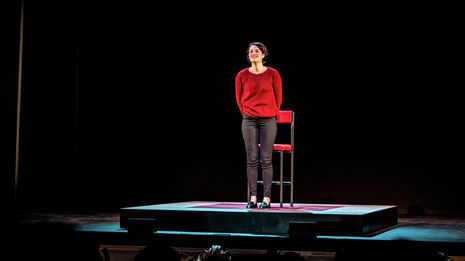Ways of seeing Phoebe Waller-Bridge: The collaboration of the camera in Fleabag
In the first instalment of a three-part series on the female gaze titled ‘Female Gazing’, Film & TV Editor Tabitha Chopping unfolds the intricacies of the camera’s use in Fleabag to create a uniquely intimate version of the female gaze

‘The female gaze’ is a term penetrating visual culture of late: this idea of ‘the divine feminine’, feminocentric fashion that doesn’t cater to lurking patriarchal eyes, and an active rejection of anything that does. Though, to centre this ‘female gaze’ in the way that visual culture currently does, as something decidedly ‘not’ patriarchal, is to centre it in something patriarchal itself, actively trying to evade its glare but inevitably falling victim to it.
“The female gaze is necessarily a collaboration; it is doubled”
Phoebe Waller-Bridge’s absolutely genius perspective-play in her show Fleabag, instead, stares the female gaze right in its face, conspiring with the viewer through secretive and irreverent asides. It is more than simply ‘breaking the fourth wall’. As Waller-Bridge intersplices her conversations with intrusive thoughts and private revelations, the viewer is radically and rapidly transformed into a conspirer in the show’s world — they gain this secretive knowledge from Fleabag and then are immediately reverted to the role of distant watcher.
“She - don’t say it - she actually - just don’t say it - she actually orgasmed when she finished it.” Fleabag is talking about her step-mother’s (Olivia Colman) art piece. Her glance shifts between looking at the man she is talking to and looking out of the camera as she tries to convince herself not to ‘say it’; it is as though the screen is a mirror, and Waller-Bridge is staring not into the eyes of the viewer, but at a reflection of herself that she so desperately (and unsuccessfully) tries to convince.
What, then, is the ‘female gaze’ for Fleabag? It is secretive, private, introspective, funny, irreverent, esoteric. Every individual watcher feels, figuratively and literally as she turns towards us, seen by Waller-Bridge. The female gaze becomes reciprocal, mirrored. Instead of maintaining the traditional hierarchy of watched versus watcher, the female gaze in Fleabag is necessarily a collaboration; it is doubled. It brings the viewer past the barrier of the screen, troubling their position as ‘viewer’. In John Berger’s Ways of Seeing, he presents the idea that women ‘watch themselves being watched’, that we internalise our existence as a viewing object for men and can never shake this feeling of being observed; refusing to be the object of the male gaze, Fleabag watches you. You feel the pressuring eyes of Waller-Bridge as she collaborates with the eye of the camera, and you still can’t quite shake this feeling of ‘being watched’, but the feeling is subverted. You begin to wonder if you can even call yourself the viewer anymore.
“Fleabag, instead, stares the female gaze right in its face”
We certainly feel our position as the viewer validated through other cinematic tropes of character: the uptight sister, the evil stepmother, the clueless father. When we see hyperbolically bumbling parents and snarky siblings, we are reminded that we are, indeed, watching a TV show. Yet, Fleabag barely exists in the world of Fleabag, and startlingly troubles this truth; she feels far too real in her proximity to us and with her soberingly sardonic remarks. This proximity, however, is only cinematic; I, for one, felt that she was unknowable. She is unnamed, much like the exhaustingly unlikeable protagonist of Ottessa Moshfegh’s novel My Year of Rest and Relaxation, which sends you, at the book’s end, poring through the pages to find an instance of her name. Though you have spent c.300 pages with the first-person narrator, though you have rolled your eyes at every display of her privilege, you feel that she is unknowable, mysterious, and distant. You have sat with the unnamed character through the haze of her self-induced periods of fugue, but they are narratively, just as they are in her memory, undocumented.
These episodic instances of intense privacy and intimacy with a character produce a strange effect, whether with this mysterious protagonist or with Fleabag, that conversely constructs someone impossibly unknowable. We feel at ease when Fleabag smirks at us, though we do not know what it means.
In fact, the moment at which she appears most vulnerable, most knowable and familiar, is in the final scene of the show where she walks off down the road and, finally, the camera stops collaborating with her. We return to the omniscient gaze, and we see Fleabag not as a set of eyes but as a familiar woman who we empathise with for being looked at. After she has watched us for twelve episodes, gotten into our heads by narrating every inappropriate, anti-feminist or sexual thought that occurred to her and made us feel like the object to be watched, she, finally and briefly , returns to being the object of watching herself. The female gaze is aborted, the collaboration ends.
“We feel at ease when Fleabag smirks at us, though we do not know what it means”
It is a disappointment known by every woman, to watch a film through masculine eyes and to see oneself only as an object to be watched, though there is equally a sense of relief when we experience this in Fleabag. Though the final gaze in this episode is not ‘male’, it poignantly reminds us, as we see her walk off, of that all-too-familiar feeling of being ‘watched’. Finally, we watch Fleabag instead of her watching us. She no longer needs the comfort of conspiring with the crowd, no longer needs to be “watched” and accompanied by someone on the other side of the screen. The rest of Fleabag’s life will go, like Ottessa Moshfegh’s protagonist, undocumented, unobserved by us, the voyeur. Separation from the camera’s eye has finally given her clarity. Ironically, when Fleabag is at her most distant, seen now from afar, we feel closer to her than ever.
 News / Judge Business School advisor resigns over Epstein and Andrew links18 February 2026
News / Judge Business School advisor resigns over Epstein and Andrew links18 February 2026 News / Gov grants £36m to Cambridge supercomputer17 February 2026
News / Gov grants £36m to Cambridge supercomputer17 February 2026 News / Hundreds of Cambridge academics demand vote on fate of vet course20 February 2026
News / Hundreds of Cambridge academics demand vote on fate of vet course20 February 2026 News / CUCA members attend Reform rally in London20 February 2026
News / CUCA members attend Reform rally in London20 February 2026 News / Union speakers condemn ‘hateful’ Katie Hopkins speech14 February 2026
News / Union speakers condemn ‘hateful’ Katie Hopkins speech14 February 2026










